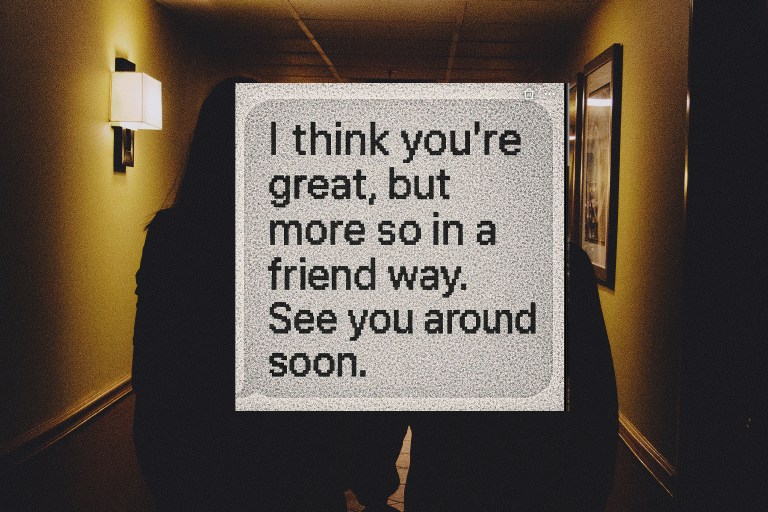
There’s A Reason You Should Be Thankful For Being ‘Benched’ Instead Of Ghosted
These crumbs act as “feelers” - texts that suggest interest or offer interaction but which require the receiver to meet them half-way and do the real leg work.

[Two Saturdays ago, 2:30am]: Hey there.
[Last Saturday, 7:12pm]: Hey you.
[Monday, 8:02am]: Good morning!
Before we go nose diving into the calamities of dating in 2016, can we all just agree on one thing? That there’s not much to those text messages, right? I mean, they’re pretty harmless.
Wrong. Well, supposedly. According to the last wave of articles sweeping the Internet this June, these sort of text messages actually are vicious. They are the shallow baitings of (cue drumroll) the bencher. Or, in plain English, the selfish transactions of an asshole.
Elaborate? You got it.
Rather than dating you—that is, taking you out and engaging in moments that intentionally enable your relationship to develop and evolve—the so-called bencher is benching you.
Let me repeat myself. A bencher doesn’t date, he benches. He gets you all dressed for the game and then throws you in the dugout. It’s just as it sounds.
“Benching” is the latest trend in dating. Actually, in my opinion, it’s less a trend (ever heard of playing second fiddle before?) and more a trending word made popular earlier this month by Jason Chen in his article, “Benchinge Is The New Ghosting.”
Only, is it the new ghosting? I’ve been ghosted before. Which is why so many of my friends sent me Chen’s article to read. In full-disclosure, it hit home. In fact, now I have a term that softens or makes sense of what my ghoster is now doing—which is, ultimately, benching me.
As I see it, though, this is nothing to bank on or to get in a tizzy about. It’s just Phase II or the second act of a lost/unavailable/egoist’s dating life agenda. He’s tossing me crumbs. Narcissists do that. As do sociopaths. The lonely are triggered into texting crumbs just the same, too. Basically, these crumbs, aka bite-sized messages, act as “feelers” – texts that suggest interest or offer interaction but which require the receiver to meet them half-way and do the real leg work.
Which is why the messages themselves can be so irritating. They are non-committal. They’re half-assed and self-serving. They may make our phone go “bing” but, read aloud, the content of the message sounds far from brave. That said, they hurt us.
After reading Chen’s article, I began to see more and more articles cropping up and echoing his same sentiment. That is, that benching is not only replacing ghosting but that it hurts the person on the receiving end way worse. This astounds me. There’s simply no way being ghosted is more bearable than being benched. And anyone who tells you otherwise, believe me, has either:
(1) not actually ever been ghosted, or
(2) is a lot more like the “bencher” than they would ever allow themselves, let alone anyone else, to think.
I want to break this right open. First, what none of these articles seem to address is why the bencher’s communication pains us. Yes, the consistent inconsistencies—the likes and “miss me?” and promised plans and first thing in the morning texts—string us along but how is this enough to elicit heartbreak rather than just annoyance?
Take the texts I’ve been receiving as our example. How could messages void of any personality actually feel like a personal gift to begin with? How could a “hey you” one minute and then silence for weeks (and so on and so forth) create in us not only a craving and devastation but such a sense of opportunity? The articles I’ve read suggest that the bencher feeding us these sporadic doses of attention is at fault. And in a sense, he is. Whoever is doing the “benching” is at the fault of their own arrested development. They do not know how to fully engage. They don’t know how to “go there.” They don’t. And that’s the painful part. But that’s painful for them, and should be less upsetting for the recipient.
Benching also isn’t the behavior of an asshole, it’s the small acts of a person who just hasn’t found his way. He does want more. Eventually. He just doesn’t know how to be more right now.
Just because he hasn’t figured that out though doesn’t mean he doesn’t want to be tied into you and your world. He does want to know you are still receptive and open to him being in your life. In fact, he even feels like he needs to know this—which is why the texts are often so in the moment and erratic—because they are triggered by the discomfort surrounding his sense of the unknown, the unknown as it relates to his life and also himself on a soulful and intimate level.
Is he likable? He doesn’t even really know. The breadcrumbs you eat are supposed to offer him hope. The bottomline is this, he just doesn’t know how to show up fully—vulnerably and not self-consciously—and he doesn’t know how to do that for anyone yet. That’s what we are witnessing: someone who is missing a sense of self but can’t say why or when they will have it.
If we had more compassion, we could let the back and forth go. We could just be annoyed by the bencher’s way of communicating and not let it toy with our mind and heart. The fact that we do means we want everything to mean more. We want everything to be about us. That’s why all these articles are calling this behavior out as that done by an asshole. Because if someone’s an asshole, that means we deserve an apology, that means we’ve been wronged and it can be fixed.
Even better is labeling the person and terming the behavior (e.g., “benching”) because it suggests that it’s not just happening to us and that we’ve also got that person nailed. We see through them and know them better than themselves. The disappointing thing is that that actually makes a lot of us feel good, at least for a moment or two.
This again is where I diverge from the common way of thinking about this whole affair.
I don’t believe those who are confused or destroyed by their being benched know themselves any better than the person benching them. Because whoever puts such importance on rather elusive and evasive relationships is at fault, too.
It’s the benchee’s fault that she values such lowly validation. And, not only that but that she turns a toad into a prince or, at least, doesn’t care to differentiate. That’s what’s painful. How little we really expect out of each other and for ourselves, how little we understand that which involves our heart, too. Not only have we set the bar real low, allowing people to treat us in ways that just doesn’t feel right, but we’ve also become wildly resistant to acknowledging our own role in the drama. Why? Why is the blame always passed off on one person, as if blame for a party of one solves anything for a party wishing to be two?
It’s our ego. It’s exactly the culprit of the bencher’s behavior which we find so selfish and appalling. That’s what is so backwards about this hot topic, that no one is really acknowledging how short-sighted it is to actually feel that being benched is worse than being ghosted.
Being ghosted is having an entire person pulled away from you. Not being left breadcrumbs.
Not “hey you’s” or selfies over Snapchat but an entire reality which then is immediately degraded into an idea.
Thinking that that person wasn’t a reality, that person maybe wasn’t even real. Our innocence and judgment is stripped from us. When you’re ghosted, it’s not that you suddenly receive a few less texts, no. You receive an unshakeable sense of absence, a silence where there once was laugher, where there once was promise and love. Time turns into an obscure misunderstanding. Your relationship feels like a sham. At least with benching, your existence is every once in awhile acknowledged.
When you’re ghosted, there is no more acknowledgment. For no reason at all, you have become nothing. And maybe you were nothing to begin with.
Benching doesn’t create this suspicion in you, though. Instead, it makes your ego spring up and dance, wondering whether you might be something to someone, wondering how much of something you are to someone. Becoming so consumed in that measuring is at your control and fault.
When you are ghosted, eventually there is no wonder. There is really no sense of self-control. If anything, you can even feel controlled by someone else’s cowardice and deceit. There’s just this unwantedness. This sense that you were never actually something, that maybe you weren’t even someone worthy of reaching out to at all. Maybe you were a mistake.
If our text message history is any conveyor of truth, then the person who is ghosted is a person who is forgettable.
The silver lining is, if you’ve been ghosted and make it out alive and on the other side, being benched will be a field day.
Because you will have lost your ego and you will understand how wrapped up people are in their own. That’s all it is.![]()











